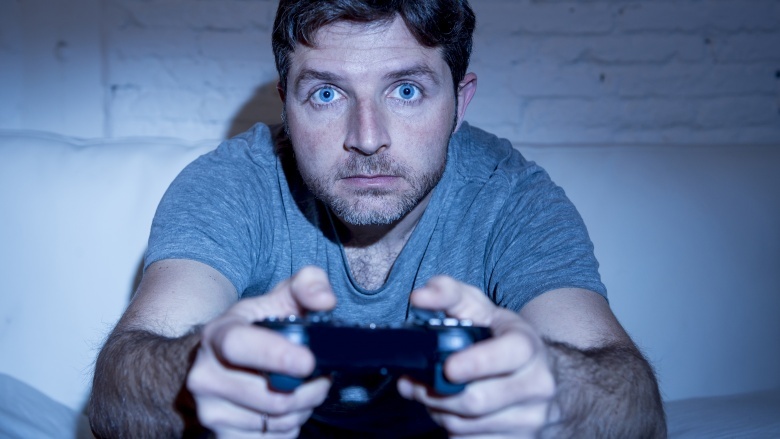What Happens To Your Body When You Play Video Games For Hours
Video games are awesome. But playing video games too much? That can be a bad thing (or a good thing!), depending on how it breaks out.
There are cases from all over the world of gamers playing too much for too long, and not surviving to actually reach the end credits. Video game addiction is a real thing, and like most good things in the world, it all comes down to pacing and moderation. Too much of anything, from water to sleep, can take you down in certain cases.
But despite the sometimes tragic effects, video games aren't all bad. First off, they're crazy fun. Second, they can improve everything from critical thinking skills to hand-eye coordination in the right context. Heck, they can even make your brain stronger at times. So let's dig into the good, the bad, and the ugly of going into the deep end of video gaming.
You can die of thrombosis
Marathon gaming sessions aren't uncommon. But when it starts to threaten your life? Yeah, that might be taking things a bit too far. A condition called deep vein thrombosis can result from frequently sitting still for too long. One British gamer died of blood clots probably formed by thrombosis after he built a lifestyle of frequent, 12-hour gaming sessions. And a New Zealand gamer went to the hospital with life-threatening blood clots in his legs after playing his PlayStation for four days on vacation.
The condition, sometimes known as "economy class syndrome," typically affects travelers of extremely long-haul flights (since there's nowhere to move around, which is where the phrase was coined). It involves blood clots that can form due to prolonged immobility or an extreme lack of physical activity.
Your heart can fail, and you can die
As CNN reports, a 32-year-old man in Hong Kong was found dead at an internet cafe following a nonstop, three-day gaming binge. The man entered a Hong Kong internet cafe on January 6, 2015, to start playing — and he was found dead by an employee on January 8. The cause of death? Cardiac failure, largely caused by immobility, cold temperatures, and utter exhaustion from lack of sleep. Employees reported he would often stay there for days on end to play, and news outlets note the other gamers at the cafe were unfazed by the paramedics and police who responded to the scene when the man was discovered. Staying awake for days on end puts an extreme strain on your body, and if you're in poor health already, it can prove too much pressure for your heart.
You can develop Nintendonitis
Even if you do take breaks and keep your body active between gaming sessions, the repetition of using a controller for hours, days, weeks, months, and years on end can still take a toll. Gaming typically requires a lot of repetitive motion with your thumbs and fingers, and the BBC reported in 2003 that some players can develop repetitive strain injuries (aka Nintendonitis) because of it. The condition happens when you repeatedly do the same motion over and over (e.g., furiously punching the same button to frag your buddies). It typically affects the wrists and hands but can move up to forearms and elbows depending on the person and the playing style.
You could mess up your lower back
A 1999 study looked at lower back pain in school children, and how it could correlate to different things such as watching TV and playing video games. The report, published in the European Spine Journal, noted video game playing can connect to back pain. Here's an excerpt from the report: "There was significantly more (lower back pain) in children who reported playing video games for more than 2 h per day, but this was not so for television watchers. The visual analogue scales concerning general well-being were all very significantly correlated with self-reported (lower back pain), with children who reported (lower back pain) being more tired, less happy, and worse sleepers."
So if you must play, at least fix your posture.
You can damage your eyes
It should not surprise you to learn that staring at screens (whether TVs, computers, phones, or tablets) for hours on end is not great for your eyes. Called computer vision syndrome (CVS), the condition affects those who spend several hours looking at screens. It can cause a wide range of problems, most commonly led by eye strain and eye pain. These problems can be exacerbated by low light and bad posture, so if you're settling in for a marathon gaming session, at least make sure you have an ergonomic chair and good lighting. Every little bit counts.
It might literally alter your brain
If you play video games enough, it can start to mess with your mind. Literally. A study published in Translational Psychiatry shows that frequent gaming might alter your brain. Put simply, children who played more than nine hours of video games each week had much larger reward centers in their brains, which could make their brains want to play more video games. The study looked at brain scans of more than 150 14-year-olds. The report noted the hardcore gamer group showed "larger volume in the left striatum, a brain area involved in risk and reward processing. In addition, the frequent gamers showed more activity in the ventral striatum when losing money during a gambling task."
If you have epilepsy, it can trigger seizures
If you're prone to seizures, it's a good idea to be careful with your gaming sessions. As a 1994 report published by the National Institutes of Health noted, the majority of patients with epileptic seizures in a small study suffered seizures while playing video games. Factors that can contribute to seizures include photosensitivity, intermittent photic stimulation, and more. For 27 of the 35 seizure patients in that 1994 study, their first seizure came while playing video games. It's important to note that games have changed a lot since 1994. There are now standards in place to guard against these sorts of triggers, although publishers might not always meet those standards.
It could make you more prone to obesity
Like the Wii before it, accessories like Xbox Kinect and Playstation Move (plus VR tech such as Oculus) are starting to push the boundaries as far as what it means to "play" a video game. But for the most part, it still means kicking back on the couch and punching buttons. Turns out that sitting around for hours on end with minimal movement can make you more susceptible to health issues associated with obesity.
The Pittsburgh Post-Gazette reported on a boatload of studies in 2012, with many of the results largely mixed. Some indicated that active video games (e.g., sports games, boxing, etc.) can have the health effect of a slow walk. Other studies found that those who play video games a lot are more likely to develop obesity from the sedentary lifestyle. The best approach? Try to mix in a little exercise and healthy snacks every few levels.
You can literally become addicted
Do anything long enough, and it can become a very strong habit that is hard to break. The same applies to video games. CNN recently reported on a study by Douglas Gentile, a psychologist at Iowa State University, who has been tracking video game players for decades. According to his findings, approximately 8.5 percent of children who play video games in the United States are addicted. Those statistics held up in several other countries, too. Gentile said the estimates can vary, but most studies found that 4-10 percent of children were classified as "addicted" to video games.
So what's the cause of video game addiction? Gentile broke it down to what he calls the ABCs: "The A Is Autonomy, we like to feel we're in control. B is Belonging, we like to feel connected to other people. And the C is Competence, we like to feel that we're good at what we do." As anyone who has ever fist-pumped after finally beating the last castle on Mario or thrown a controller at the TV over an interception in Madden can attest, video games can drive real emotions. Psychologist Mark Griffiths, director of the International Gaming Research Unit at Nottingham Trent University, added that the addiction can also be related to the constant rewards built into video games, from hitting high scores to merely the sense of accomplishment.








